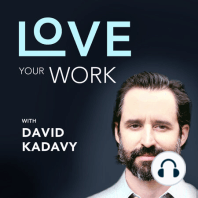36 min listen
307. A.I. Can't Bake
FromLove Your Work
ratings:
Length:
9 minutes
Released:
Jul 27, 2023
Format:
Podcast episode
Description
You’ve probably heard that, in a blind taste test, even experts can’t tell between white and red wine. Even if this were true – and it’s not – it wouldn’t matter. I was in Rome last month, visiting some Raphael paintings to research my next book, and stopped by the Sistine Chapel. I’ve spent a good amount of time studying what Michelangelo painted on that ceiling. There are lots of high-resolution images on Wikipedia. But seeing a picture is nothing like the experience of seeing the Sistine Chapel. You’ve invested thousands of dollars and spent fifteen hours on planes. You’re jet-lagged and your feet ache from walking 20,000 steps. You’re hot. When you enter, guards order you to keep moving, so you won’t block the door. They corral you to the center, and you can finally look up. When you hear wine experts can’t tell between white and red wine, you imagine the following: Professional sommeliers are blindfolded, and directed to taste two wines. They then make an informed guess which is white, and which is red. In this imaginary scenario, they get it right half the time – as well as if they had flipped a coin. If it were true wine experts couldn’t tell between white and red wine, the implication would be that the experience of tasting wine is separate from other aspects of the wine. That the color, the shape of the glass, the bottle, the label, and even the price of the wine are all insignificant. That they all distract from the only thing that matters: the taste of the wine. There’s some psychophysiological trigger that gets pulled when you tilt your head back. Maybe it stimulates your pituitary gland. When you have your head back and are taking in the images on the Sistine Chapel ceiling, you feel vulnerable. (You literally are vulnerable. You can’t see what’s going on around you. You’d be easy to physically attack.) What you see is overwhelming. As you try to focus your attention on some detail, some other portion of the imagery calls out and redirects your attention. This happens again and again. After a while, your neck needs a rest, and you return your gaze to eye-level. And this is almost as cool as the ceiling: You see other people with their heads back, their eyes wide, mouths agape, hands on hearts, tears in eyes. You hear languages and see faces from all over the world. You realize they all, too, have invested thousands of dollars and spent fifteen hours on planes. They, too, are jet-lagged and hot and have walked 20,000 steps. You can look at pictures of the Sistine Chapel ceiling on the internet. You can experience it in VR. In many ways, this is better than going to the Sistine Chapel. You can take as much time as you want, and look as close as you want. You don’t have to spend thousands of dollars and fifteen hours on a plane, take time off work, or even crane back your neck. But seeing the Sistine Chapel ceiling on the internet or even VR is only better than seeing it in person, in the way that a spoonful of granulated sugar when you’re starving is better than a hypothetical burger in another iteration of the multiverse. We’ve seen an explosion of AI capabilities in recent months. That has a lot of people worried about what it means to be a creator. Why do we need humans to write, for example, if ChatGPT can write? The reason ChatGPT’s writing is impressive is the same reason there’s still a place for things created by humans. Anyone old enough to have been on the internet in the heyday of America Online in the 1990s will remember this: When you were in a chat room, most the conversations were about being in a chat room: How long have you been on the internet? Isn’t the internet cool? What other chat rooms do you like? Part of the appeal of the question “ASL?” – Age, Sex, Location? – was marveling over the fact you were chatting in real-time with a stranger several states away. Or maybe you remember when Uber or Lyft first came to your town. For the first year or two, likely every conversation you had with a d
Released:
Jul 27, 2023
Format:
Podcast episode
Titles in the series (100)
25. Steve Case: Persevere in "The Third Wave" – how entrepreneurs will transform entrenched industries: Steve Case is the former CEO of AOL – America Online. Many of you probably chuckle when you see someone with an email address that ends in AOL.com, but for me and many millions of others, AOL was our first contact with the Internet. Steve has a... by Love Your Work
